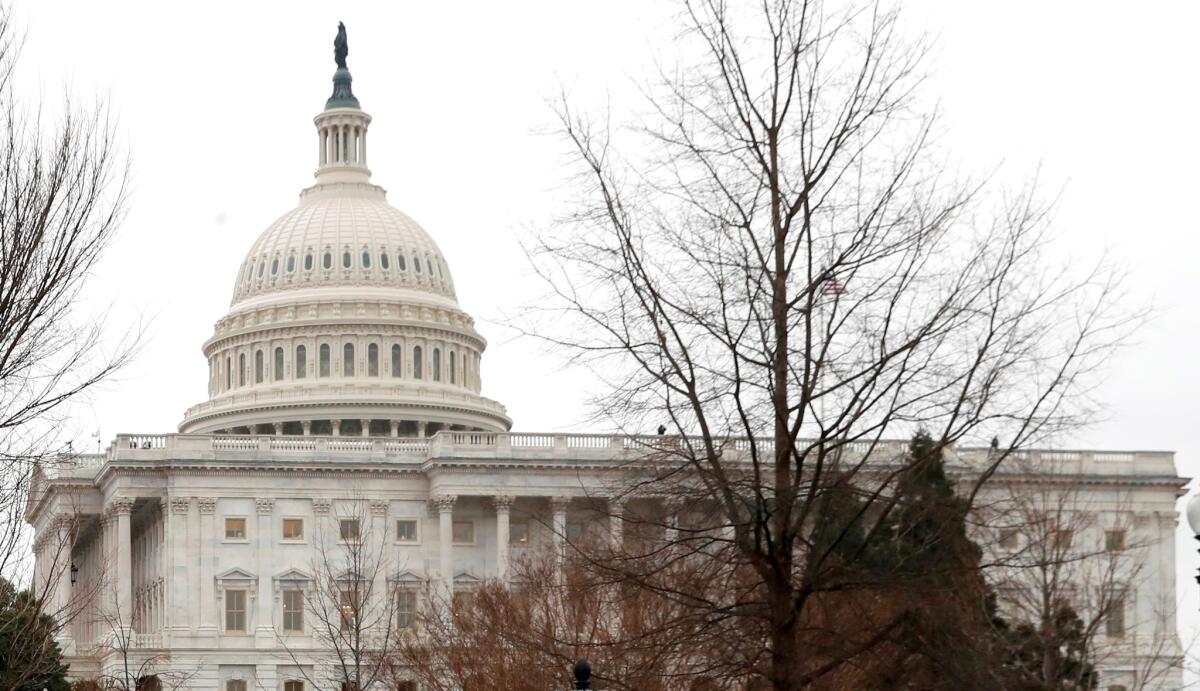No, impeachment doesn’t require a criminal act

- Share via
As the House Judiciary Committee begins its impeachment hearings, there is only one question that matters and the rest is just noise: Is it an impeachable offense for the president to use the powers of his office for his own political gain?
There is much discussion about whether President Trump will present a defense, whether witnesses like John Bolton and Rudolph W. Giuliani will comply with subpoenas and testify, and whether the whistleblower will come forward. But none of that is likely to matter. The facts of what happened are not in dispute.
Trump’s own words and the testimony at earlier hearings by witnesses such as Gordon Sondland (U.S. ambassador to the European Union), Fiona Hill (a former official at the National Security Council), and William B. Taylor Jr. (head of the U.S. Embassy in Ukraine) leave no doubt that Ukrainian officials were informed that military aid depended on their investigating Joe Biden and his son Hunter Biden. Even White House acting Chief of Staff Mick Mulvaney told reporters it was a “quid pro quo,” though he later recanted. The sole issue before the House Judiciary Committee, and ultimately the House of Representatives and the Senate, is whether this conduct should be deemed a high crime or misdemeanor.
I expect that those defending Trump will argue that criminal conduct is required for an impeachment and that Trump did not violate any law. They will say it is common practice for presidents to use foreign aid as leverage to influence a country’s behavior. But it should be remembered that it is a federal crime to solicit something of value from a foreign government in an election campaign.
More importantly, it is clear from statements at the Constitutional Convention and in the Federalist Papers that “high crimes and misdemeanors” were not to be limited to criminal acts, but were meant to include significant abuses of power. Alexander Hamilton said that the Constitution authorizes impeachment for “the misconduct of public men, or, in other words, from the abuse or violation of some public trust.” In his definitive work on impeachment, the late Yale law professor Charles Black said that no criminal act is required, but to be a high crime and misdemeanor it must “in some way corrupt or subvert the political and governmental process.”
Historical practice also demonstrates that “high crimes and misdemeanors” do not require a criminal act. President Andrew Johnson was impeached in 1868 for firing Secretary of War Edwin Stanton in violation of the Tenure in Office Act. After the end of the Civil War, Congress became increasingly frustrated with Johnson, a Southerner from Tennessee, presiding over Reconstruction. Congress adopted the Tenure in Office Act to keep Johnson from firing Lincoln’s Cabinet. The act declared that such a firing would be deemed a “high misdemeanor.” The House impeached and Johnson avoided removal by just one vote in the Senate, even though the conduct was not criminal and, based on later Supreme Court cases, was very much within the president’s powers.
Moreover, the Constitution should be understood as allowing impeachment for serious abuses of power even if no crime occurs. Imagine a president who repeatedly engages in unconstitutional conduct that is not criminal: say, using American troops in foreign countries in an outrageous manner to protect the president’s own personal interests at great loss of life, or refusing to allow the spending of money authorized and appropriated by Congress, or by ordering criminal prosecutions of his enemies, or continually violating the emoluments clause. What remedy exists if only a criminal act would be impeachable? Republican leaders might say that voters will have the right to decide the matter in the end by reelecting the president or not. But upholding the Constitution should not depend on the voters’ preferences.
Trump’s supporters may also argue that he did nothing wrong, that he was acting to ensure Ukraine investigated corruption. This turns not on the meaning of the words in the Constitution, but on whether this is a plausible account of what the president meant when he said, “I would like you to do us a favor, though.”
The difficulty is that, as Fiona Hill expressed with great force, there is no evidence that Ukraine was involved in the 2016 presidential election. Nor is there any evidence that Joe Biden or Hunter Biden were involved in any corrupt activities. It strains credulity to see Trump as focused on corruption in Ukraine, rather than trying to get dirt on a political rival, when he seems unconcerned with any other evidence of corruption in Ukraine – or, for that matter, with corruption elsewhere in the world.
So in the end, the days and weeks of hearings to come aren’t really about the law or the facts. But that should not be surprising in that impeachment proceedings are not like a court trial. Everything comes down to a judgment: Is Trump’s conduct an abuse of power that warrants removal from office? I wonder if the hearings will change anyone’s mind on that central question.
Erwin Chemerinsky is dean of the UC Berkeley School of Law and a contributing writer to Opinion.
More to Read
A cure for the common opinion
Get thought-provoking perspectives with our weekly newsletter.
You may occasionally receive promotional content from the Los Angeles Times.









